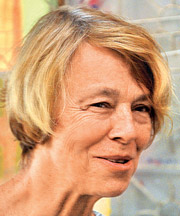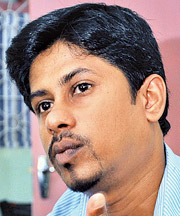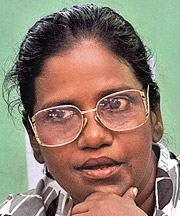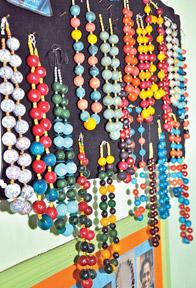|
NIMH Occupational Therapy Department:
A ray of hope for mental patients to regain life skills
By Ranil WIJAYAPALA
|

Bead-making group with Vidyani who is at extreme right
|
An aura of sanity prevailed in the huge hall, though it was a place
commonly known as a place for mental illness. But at a glance it looked
like a place for creative people as paintings, craft and patchwork and
many other art works were visible in small rooms within the hall as if
it was an exhibition hall.
All those in the hall were engaged in work like any other worker in a
workshop or factory. They were mental patients who were undergoing
psychiatric treatment at the Angoda Mental hospital, which is under the
National Institute of Mental Health (NIMH).
They all have a story to tell as they have experienced so many sad
moments in their lives thus ending up as mental patients and being kept
at the Angoda hospital for a long time. They are eagerly waiting to
return to their normal lives to play the role they played previously as
responsible members of society.
Like Vidyani, a former freelance writer and journalist, and Kamini, a
senior lawyer by profession who are eagerly waiting to return to society
to engage in their former professions after getting rid of their mental
illnesses. Many other patients sought the help of occupational
therapists to rebuild their shattered lives due to mental illness.

Anne Martin |

Asoka Sanjeewa on
Occupational Therapist |
 |
| Kamini |
The Occupational Therapy Department of the Angoda mental hospital has
become a healing ground for many as it provides a wide range of
opportunities for patients to refresh their minds and prepares them to
return to society. They may have spent months and years at the hospital
as patients, either without any place to go to or due to taking
treatment for a long period, but they can engage in activities according
to their interests and come out of the agony.
For Vidyani, who has spent more than one and a half years at the
hospital, the OT Department has become her favourite place in the
hospital. She is so enthusiastic about and wakes up as early as four in
the morning to avoid the rush for the toilets and reaches the OT
department to engage in bead making. Vidyani teamed up with Kamini,
Deepthi and a number of other patients who were reluctant to identify
themselves and were not in a position to express their views with us,
were making beads out of paper pulp to make necklaces and become
partners of - Mindful Jewellery _ a new jewellery line created by the OT
Department of NIMH.
 |
|
Necklaces made out of beads |
The idea first originated when a teacher from the Central School of
Art in London introduced the creation of paper pulp beads to the NIMH OT
Department.
When Deepthi and the others are making paper beads, Vidyani paints
them in different colours to make different coloured paper beads. Kamini
drills all these beads with a small machine to knit them together into a
nice necklace.
"I am enjoying the work and we are selling these to Barefoot Gallery
and earn some money to spend for our needs," Vidyani says in a happy
mood.
She thinks one day she can reunite with her son now living abroad and
send him some money for his education and also to begin her work as a
freelance writer. Like Vidyani, Kamini also wants to get back to her old
profession to practise as a lawyer and reunite with her sister who is
now living abroad.
"I enjoy this work and it helps me a lot to spend time at the
hospital as a happy person till I commence my career as an immigration
lawyer,"Kamini also added.
Anne Martin, a volunteer from the Volunteer Services Overseas based
in the UK working at the NIMH OT Department said that there is a big
demand for necklaces they make at the OT Department as Barefoot is ready
to purchase whatever stocks that are made. "We cannot run this as a
business to compete with others, what we need is to produce quality work
with the involvement of mental patients at the OT Department and make
use of the money they earn out of this product to buy materials needed
and for the little requirements of the patients," she added.
She prefers if such a facility is made available outside the
hospital, enabling all patients who cannot earn a living after the loss
of their previous skills due to mental illnesses.
The bead making is not the only skill the OT Department provides for
the patients at the wards.
"Patients also make bed covers, patchwork, jewellery boxes and lot of
other handicraft items with the support of the staff at the OT
Department. They can engage in sewing, and other activities according to
their interests and skills under the guidance of the hospital staff and
a few experts who visit the Department from time to time to teach them
new things," she added.
Giving a broader picture about the Occupational Therapy department of
the NIMH, Asoka Sanjeewa, an Occupational Therapist working at the
Angoda Mental Hospital said both mental hospitals in Angoda and
Mulleriyawa have Occupational Therapy Department for special activities
for patients.
|

A sewing group |
"For the rehabilitation of patients undergoing psychiatric treatment
we have facilities in the ward itself. Specially in the intermediate
wards where patients stay more than one month after initial treatment at
acute wards we have direct based activities run by nurses and
occupational therapists as the hospital administration facilitates them
to start these activities. For special activities we have the
Occupational Therapy Department," he added. "We start rehabilitation
from the ward itself. They can start such work according to their
abilities, interests and they can get special help from the OT
department," he added. "We have seven occupational therapists in Angoda.
And two Occupational Therapists in Mulleriyawa. The Chief Occupational
Therapist is working at the paying or the villa wards," he added. "In
the OT Department we get inpatients and outpatients also. If somebody is
discharged from the hospital for a limited period they can ask for
support from the OT to visit us on a daily basis or weekly basis and
continue their programs," he added. What they do at the OT Department is
to find out the needs of the patient, what they want to do and what they
want to be occupied with.
"At the initial assessment we find their roles and their previous
functional level. With these features we develop an activity schedule
and support him to get back his previous life skills, role and sometimes
professional skills based on vocational activities. We try to engage him
in scheduled activities which is purposeful to him to achieve previous
skills, roles and responsibilities," he added.
In that sense this program helps people to occupy themselves
including looking after themselves, controlling themselves and
contributing to the socio-economic means of their family. "Basically we
target three areas self care, leisure and productivity. Self care is
looking after themselves, leisure is to spend their time with their
leisure activities, and productivity means socio-economic means to
earning money and productively engage in vocational activities becoming
a productive person in their families," he added.
"If we are don't earn we are not valuable to the family. Money is the
key. That is why we started some selected activities which can earn
bring in money. Otherwise just participating in activities is not that
meaningful," Asoka added.
Occupational therapy is useful for self care, wealth, leisure,
independent function, enhance development and prevent disability. "We
talk about disable condition when considering the physical aspect but in
a psychiatric condition people are at a disadvantage because there is a
stigma attached to mental condition," he added.
"Sometimes people have skills and talent but at some stage they
cannot perform their skills by facilitating them to use those skills
through participation in activities. That is why when we prepare an
occupational therapy program based on a particular patient or a client
it should be relevant to that person," Asoka added.
Sometimes it is difficult to develop or upgrade skills to previous
levels. "To do that we have to arrange the working environment. Whatever
difficulties are there in their families, the working environment has to
be considered. This is adaptation.
We have to prepare them to face those difficulties in their families
and also the workplace. Then we can think of changing the environment
according to the problems," he added. To achieve this we have to
organise vacation based activities and leisure-based activities as well
as run special groups to facilitate their interests.
"With the initial assessments we identify their interests and
activities which are useful to them. Considering these factors we
prepare timetables. For example a patient like Vidyani who is a
professional writer is engaged with the creative writing group," he
added."Occupational Therapists believe that people with mental health
problems by engaging in meaningful activities and occupations improve
their quality of life, thereby benefiting both their physical and mental
well-being," he added.
Our aim is to address the stigma in society through their creation.
We are printing annual calendar using the artwork of patients. October
10 is World Mental health day and we had an art exhibition at the
National Art gallery last year and this year too we are preparing to
have an exhibition aimed at addressing the social stigma," he added.
"If we can have a separate unit inside the hospital or outside
enabling patients to visit and engage in activity to earn their living
that will be a welcome move. If the private sector assists this would
then be a reality and will be a boon to mentally ill people who can not
return to their profession. We also invite professionals and artists to
share their experience with these patients with mental problems to give
them a light of hope for their life," Asoka added. |

